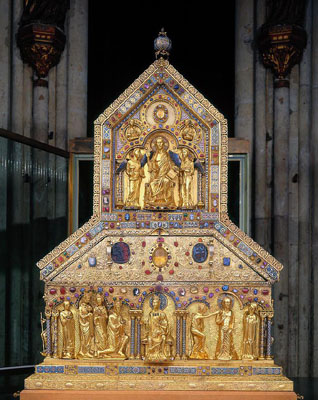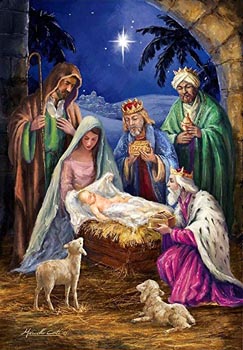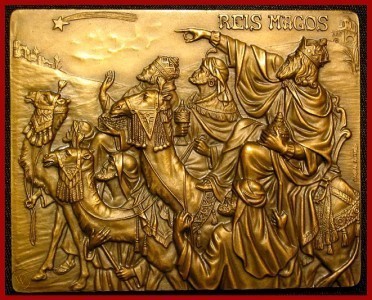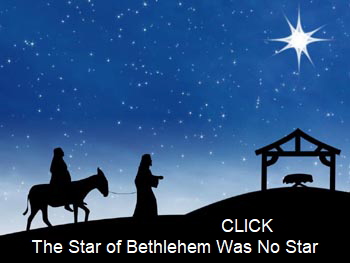|
FIVE
The Star Marks Victory
They came from the East asking, "Where is He who has been born King of the Jews?" for they did not know. Who were these Wise Men? Or were they wise? They have been called Great Kings - Blessed Servants of God. But surprisingly enough kings they were not, their deed was not great, and a blessing is far from what they received.
The story originated from the biblical account in Matthew and from there it was composed into an enchanting fairy tale. The church has taught for centuries a wonderful, miraculous story pertaining to these Wise Men. Not only were they given names and places from which they came, but have come to develop three distinct personalities along the way. The gifts they brought to the infant Jesus also came to hold great symbolic meaning. There is Melchior, ruler of Numbia and Arabia; Kaspar of Tarsus; and Balthasar of Ethiopia. Their gold signifies acceptance of Christ as King; frankincense, recognition of Christ's deity; myrrh, prophetic of Christ's death.
Exchanging gifts were part of the heathen festival the church adopted and so the Wise Men's gifts harmonized ideally with the Christmas story. This practice was kept intact and has been carried on ever since.
 The Wise men became exceptionally honored. Their mummified bodies, it has been said, were preserved in Constantinople before being transferred later to the Cologne Cathedral. There is no way to prove that these bones could have been the Wise Men's bones, just as there is no way to prove that their names or places from where they came are true. As for the gifts they brought exhibiting symbolic meaning, the Bible declares no such interpretation of them. The Wise men became exceptionally honored. Their mummified bodies, it has been said, were preserved in Constantinople before being transferred later to the Cologne Cathedral. There is no way to prove that these bones could have been the Wise Men's bones, just as there is no way to prove that their names or places from where they came are true. As for the gifts they brought exhibiting symbolic meaning, the Bible declares no such interpretation of them.
The stories we have come to know are more fictional than fact. The question is, why did the church go to such great lengths to compose so many whimsical imaginations? What part do the Wise Men play in the development of Christmas? We certainly cannot deny they do play a leading role. This is obvious by the way they have crept into every aspect of Christmas. They are displayed standing at the manger with the infant Jesus, Joseph and Mary, the shepherds, and hovering above is that brilliant star.
Love and adoration for the Wise Men aroused the idea to grant them their own day of celebration: the Feast of Epiphany. There are songs, poetry, abundant stories, and even movies about them. They have touched the innermost passions of the heart. Some of the most exquisite portraits and striking figurines have added much to their cherished fame. Their popularity is greater than Joseph, John the Baptist, or all of Christ's apostles. How, one should ask, did this come about?
There are no Scriptures to support these tales but there are some familiar Old Testament Scriptures that have done fairly well in upholding this belief, though they have been plucked out of context and molded to fit a very wayward theory. If we look at these Scriptures, unabridged, you will realize that they don't fit the Wise Men. When a fraction of these Scriptures are read they appear to constitute an ‘almost-perfect’ story, particularly when mingled in with similar Scriptures. For the record let's look at the evidence:
|
Psalms 72: 1-19
Give the king thy justice, O God, and thy righteousness to the royal son!
May he judge thy people with righteousness, and thy poor with justice!
Let the mountains bear prosperity for the people, and the hills, in righteousness.
May he defend the cause of the poor of the people, and give deliverance to the needy, and crush the oppressor!
May he live while the sun endures and as long as the moon, throughout all generations!
May be be like rain that falls on the mown grass, like showers that water the earth!
In his days may righteousness flourish and peace abound, till the moon be no more!
May he have dominion from sea to sea, and the river to the ends of the earth!
May his foes bow down before him, and his enemies lick the dust!
May the kings of Tarshish and the isles render him tribute.
May the kings of Sheba and Seba bring gifts!
May all the kings fall down before him, all nations serve him!
For he deliver the needy when he calls, the poor and him who has no helper.
He has pity on the weak and the needy, and saves lives of the needy.
For oppression and violence he redeems their life, and precious is their blood in his sight.
Long may he live,
May gold of Sheba be given to him?
May prayers be made for him continually and blessings invoked for him all the day!
May there be abundance of grain in the land; on the tops of the mountains may it wave; may its fruit be like Lebanon; and may men blossom forth from the cities like the grass of the field!
May his name endure for ever, his fame continue as long as the sun.
May men bless themselves by him, all nations call him blessed.
Blessed be the Lord, the God of Israel, who alone does wondrous things.
Blessed be his glorious name for ever; may his glory fill the whole earth!
Amen and Amen!

Isaiah 60: 1-12
Arise, shine; for your light has come, and the glory of the Lord has risen upon you.
For behold, darkness shall cover the earth, and thick darkness the peoples; but the Lord will arise upon you, and his glory will be seen upon you.
And nations shall come to your light, and kings to the brightness of your rising.
Lift up your eyes round about and see; they all gather together, they come to you; your sons shall come from far, and your daughters shall be carried in the arms.
They you shall see and be radiant, your heart shall thrill and rejoice, because the abundance of the sea shall be turned to you, the wealth of the nations shall come to you.
A multitude of camels shall cover you, the young camels of Mid'ian and Ephah; all those from Sheba shall come.
They shall bring gold and frankincense and shall proclaim the praise of the Lord.
All the flocks of Kedar shall be gathered to you, the rams Nebai'oth shall minister to you.
They shall come up with acceptance on my altar, and I will glorify my glorious house.
Who are these that fly like a cloud, and like doves to their windows?
For the coastlands shall wait for me, the ships of Tarshish first, to bring your sons from far, their silver and gold with them, for the name of the Lord your God, and for the Holy One of Israel, because he has glorified you.
Foreigners shall build up your walls, and their kings shall minister to you; for in my wrath I smote you, but in my favor I have had mercy on you.
Your gates shall be opened continually; day and night they shall not be shut; that men may bring you the wealth of the nations, with their kings led in procession.
For the nation and kingdom that won't serve you shall perish; those nations shall be utterly laid waste!
|
|
Some of these Scriptures can arouse a certain curious connection, but here is the undisputed fact: the Wise Men were not kings. These Scriptures therefore do not apply to them. They refer to those who ruled earthly kingdoms. Men with great material power. The title ‘Wise Men’ in Matthew's account reads ‘Magos’ in the original Greek Scriptures, though they are better know as the ‘Magi’ to most people. The magi/magos is rooted in the word magic, making the Wise Men ‘magicians’, They were men lured by the dark forces of the underworld using skills that are strongly forbidden and boldly condemned by God.
|
Wycliff Bible Encylopedia states:
The Magi were a class of learned men originating in Persia or Babylonia, who were experts in the lore and science of their day and in the interpretations of dreams. Because they dealt with occult learning, their name gained the connotation of the modern term ‘magician’
These names, magic/magician, come from the name of a priestly class of ancient Media. The Magi or Wise Men, were not only sacrificial priest but men who interpreted the meaning for human affairs of heavenly phenomena.
Magic, divination, sorcery, enchantment and witchcraft are all connected with a belief in superhuman or occult powers and are ways which men have sought to obtain knowledge of the future and assistance in the affairs of life.

The Expository Dictionary of Bible Words by Lawrence O. Richards confirms:
The occult has fascinated people of every age and culture. Is it possible to control persons and events supernaturally? Can one manipulate supernatural beings and forces? In the ancient world, the majority were sure the answer was yes! Only a knowledge of God's true nature and his relationship to the world can place the occult in perspective and shatter the pretensions of those who dream of mastery through manipulations of the world beyond.
The Greek word for magic is ’mageia’ (its only New Testament use occurring in Acts 8:11. The new Testament identifies a few people as magicians. Of its six uses in the New Testament, the Greek term, ‘mago’, is used four times of the wise men who visited the child Jesus (Matt. 2: 1; 7, 16) and twice of Bar-Jesus (Acts 13: 6, 8).
The Bible consistently rejects all forms of occult practice. Such practices deny the nature of God as sovereign Lord. And for persons in a personal relationship with the Lord, occult practices are a contradiction of the role God wants to play in their lives.
The Bible does not deny that supernatural influences may be associated with some occult practices. Demons are viewed as realities in the New Testament, and demoniac activity may partially explain achievements ascribed to the occult.
The Old Testament strictly forbade God's people to practice any magical or occult art or to consult those who did so. The practice was viewed so seriously that the death penalty was prescribed for any violation (Ex. 22:18; Lev. 19: 26, 31, 20: 6 , 27). (Reprinted by permission of Moody Bible Institute, Chicago, Illinois.)
The nation of Israel was bluntly warned about all occult practices: "When you enter the land of the Lord your God is giving you, do not learn to imitate the detestable ways of the nations there. Let no one be found among you who sacrifices his son or daughter in the fire, who practices divination or sorcery, interprets omens, engages in witchcraft, or cast spells, or who is a medium of spiritist or who consult the dead. Anyone who does these things is detestable to the Lord (Deut. 18: 9-12).
The passage moves immediately to God's promise to send prophets, who would be his messengers to his people. The reason that the practice of the occult is such a serious sin is that it denies the basic nature of God.
The God of Scripture is ruler of the material and immaterial universe. All is under His sovereign authority. To appeal by magic to spiritual forces is to deny God as "Master of All; and to turn from God to other powers for help. For the person who knows God as sovereign Lord and has established a personal relationship with him, turning to magic or occult is a deadly insult. To turn to magic is to turn away from God and necessarily implies either a lack of trust in His power or doubts about His Love. (Taken form Expository Dictionary of Bible Words by Lawrence O. Richards. Copyright 1985 by the Zonervan Corporations. Used by permission)
|
|
With this knowledge in mind, would God intentionally employ men who practiced occultism to be the light of the Gentile world? What does Jesus say in regard to the matter that would make the churches' teaching entirely ineffectual? "If a Kingdom is divided against itself, the Kingdom cannot stand" (Mark 3:24).
If God did choose these men then his plan would have been a Kingdom divided against itself because they caused a lot of devastation to a lot of people. The way the church narrates the story makes little sense. God certainly did not want His Son killed, or all those innocent children, as it turned out.
What Kingdom took the fall then? Was it not Satan's plan that was crushed to nothingness? Did not God go on to fulfill His purpose? According to the Bible He did. Jesus' life was protected and Satan's scheme ultimately failed, causing him to strike out in anger. Satan's revenge to mass slaughter untold numbers of children only proves his own defeat.
Why don't people see the Magi's question (Where is he who has been born King of the Jews?) as being disturbing? Why do they see right past the words troubled, secretly, warned, and tricked when they read Matthew's account? Key words that if one were to ponder upon would come alive with meaning. Taking a good look at Matthew Chapter Two and applying them in their rightful perspective may arouse a new awareness for those who never gave them much thought.
|
Now when Jesus was born in Bethlehem of Judea in the days of Herod the king, behold, wise men for the East came to Jerusalem, saying, "Where is he who has been born king of the Jews? For we have seen his star in the East and have come to worship him." When Herod the king heard this, he was troubled, and all Jerusalem with him; and assembling all the chief priest and scribes of the people, he inquired of them where the Christ was to be born. They told him "In Bethlehem of Judea; for so it is written by the prophets: And you, O Bethlehem, in the land of Judea, for from you shall come a ruler who will govern my people Israel".
 Then Herod summoned the wise men secretly and ascertained from them what time the star appeared, and he sent them to Bethlehem, saying, "Go and search diligently for the child, and when you have found him bring me word, that I too may come and worship him." When they heard the king they went their way; and lo, the star which they had seen in the East went before them, till it came to rest over the place where the child was. When they saw the star, they rejoiced exceedingly with great joy; and going into the house they saw the child with Mary his mother. Then, opening their treasures, they offered him gifts, gold and frankincense and myrrh. And being warned in a dream not to return to Herod, they departed to their own country by another way. Then Herod summoned the wise men secretly and ascertained from them what time the star appeared, and he sent them to Bethlehem, saying, "Go and search diligently for the child, and when you have found him bring me word, that I too may come and worship him." When they heard the king they went their way; and lo, the star which they had seen in the East went before them, till it came to rest over the place where the child was. When they saw the star, they rejoiced exceedingly with great joy; and going into the house they saw the child with Mary his mother. Then, opening their treasures, they offered him gifts, gold and frankincense and myrrh. And being warned in a dream not to return to Herod, they departed to their own country by another way.
Now when they departed, behold, an angel of the Lord appeared to Joseph in a dream and said "Rise, take the child and his mother, and flee to Egypt, and remain there till I tell you; for Herod is about to search for the child to destroy him." And he rose and took the child and his mother by night, and departed to Egypt, and remained there until the death of Herod. This was to fulfill what the Lord had spoken by the prophet, "Out of Egypt have I called my son."
Then Herod, when he saw that he had been tricked by the wise men, was in a furious rage, and he sent and killed all male children in Bethlehem and in all that region who were two years old or under, according to the time which he had ascertained from the wise men. Then was fulfilled what was spoken by the prophet Jeremiah: "A voice was heard in Ramah, wailing loud lamentations, Rachel weeping for her children; she refused to be consoled because they were no more" (Matt. 2:1-8).
|
|
Consider the evidence. The Magi aroused trouble in the city. Herod, when he leaned of this troubling news, sought help from his chief priests and scribes who sought God's Scriptures. Herod thus secretly summoned the Magi.
If God inspired the Magi then why did they have to secretly meet with Herod in order to find the whereabouts of Jesus? It was right in the Scriptures. Then again, what need would they have to search the Word if God was guiding them? The fact is, they had no idea where they were headed, or for what purpose, other than seeking out some strange phenomenon connected to their own occult convictions.
Since Jesus was possibly up to two years old when these men arrived, this indicates that He had been under Herod's nose all along. This would unquestionably mean that His birth had been kept quiet for a reason, and most likely would have remained hidden until Jesus' appointed time to become known.
The Scriptures do tell us that these events were foretold, and the church bases a lot of its foundation on them, but God unveils a great deal of Satan's cunning tricks. So why would this one incident be an exception? There is nothing the serpent can or will ever do that God does not know, cannot divert, and hasn't warned mankind already. The question is, were the words from the Wise Men a wonderful proclamation of the Lord's birth, as we have been taught, or perhaps (unsuspecting to them) a secret tip for God's adversary?
What about that star, the one most Christians display such an admiration toward? Is there something obscure about it that we should know? It was, after all, what enticed the Magi to Jerusalem before disappearing and then reappearing after its mission was complete.
 The church calls this star "God's guiding light," but there is nothing to confirm this theory. So what are we to believe? Again, the truth hinges on how the story reads. We can only guess how far the Magi must have traveled because Scripture does not say. It does tell us they were full of great joy when they arrived, and after seeing Jesus they offered their gifts. But the glory of the Lord did not shine around them like it did with the shepherds. They did not make known their visit to Jerusalem proclaiming the good news as the shepherds had after seeing the Angels. They did not leave glorifying and praising God with the same wonderful feelings the shepherds had because they left with a warning to leave, by another way one might notice. Couldn't they have come by another way as well? The church calls this star "God's guiding light," but there is nothing to confirm this theory. So what are we to believe? Again, the truth hinges on how the story reads. We can only guess how far the Magi must have traveled because Scripture does not say. It does tell us they were full of great joy when they arrived, and after seeing Jesus they offered their gifts. But the glory of the Lord did not shine around them like it did with the shepherds. They did not make known their visit to Jerusalem proclaiming the good news as the shepherds had after seeing the Angels. They did not leave glorifying and praising God with the same wonderful feelings the shepherds had because they left with a warning to leave, by another way one might notice. Couldn't they have come by another way as well?
The important question is where was the great welcome for these men who were supposedly beckoned to come by God himself? Men that are supposed to represent the first gentiles to receive God's blessing. Does this honestly sound like a wondrous moment in history that opened the door for the entire Gentile world, as it is claimed? Or more accurately, just another deplorable episode to a lifetime undertaking to defeat God in the manner that has been totally misrepresented?
An entirely new perspective can emerge when Matthew's account is seen in its proper setting with no glitter, no glamour, no reading between the lines imagining an extraordinary event. Then, the message becomes clear: that star served a purpose of another kind. It's not the purpose that we have always imagined, it is a purpose that should be acknowledged as truth, because this star was a sneaky detour, a play to meet its Master' needs and has been unduly glorified as God's own personal act winning much unwarranted praise. As the Magi have received an undeserved recognition for it, as well.
The clergy assures us that the Magi were the special chosen on the foundation that Daniel, being chief prefect of all the Magi, was God's faithful servant; a title one might notice did not come from God. If we take a look at the Book of Daniel we will see how that title came about and how Daniel felt about it.
The story begins when Daniel was taken captive to Babylon. Bible Scholars indicate the time was 603 B.C. Other Jewish youths were taken with him and they were instructed in the learning and language of the Chalde'ans. They were offered rich and lavish foods, but Daniel and his three friends would not defile themselves against the laws of God.
When king Nebuchadnez'zar had a dream, not one of his wise men would interpret it. The king became angry thus ordering all the wise men to be killed. Daniel, not wanting to die, prayed to God for mercy. His prayers were answered. He was able to interpret the dream. This greatly impressed the king and he commanded that Daniel be the chief prefect over all the wise men.
Daniel refused the king's offer requesting that his three friends be appointed to oversee the affairs of Babylon. He preferred to stay with the king. King Nebuchadnez'zar then made an image of gold and commanded that everyone should bow down and worship it. Certain Chalde'ans came forward and maliciously accused Daniel's three friends of disobeying the order and they were cast into a fury fire. But God protected them because of their loyalty, so not one hair was burned. The king was amazed and commanded that no one speak against the God of Shadrach, Meshach and Abed'nego.
Daniel continued to interpret Nebuchadnez'nar's dreams and later King Belshaz'zar's handwriting on the wall. He refused the gifts offered to him for his great wisdom, but the king commanded he be clothed in purple, a chain of gold was put around his neck and a proclamation was made concerning that he should be the third ruler in the kingdom. That very night the Persian army took the city by surprise, just as Daniel had predicted. Darius the Mede received the kingdom and set up his own satraps and presidents, Daniel being one of them.
Daniel became very distinguished and certain officials plotted against him to bring charges that he had been praying to his God. Daniel was thrown into the lions' den. Through God's protective hand, Daniel survived and those who had accused him, as well as their families, were cast into the lions den to be devoured.
Daniel held several official offices but he never compromised his faith, being gifted therefore with great wisdom. He did not use occult practices nor associate himself with practitioners of the occult. This caused him to remain in good standing God. His name and fame became well-known among all men, including the Magi, for his abilities to interpret dreams. Among those dreams was the coming of the Messiah.
 The term magi (or magos), represents a number of occult skills: magicians, sorcerers, wizards, enchanters, diviners, and astrologers. Bible scholars primarily refer to the Wise Men in Matthew's account as astrologers, perhaps for the simple reason that they were following a star. For centuries astronomers have tried to discredit this star as a conjunction of planets or a comet. Anything other than the miraculous event that the Christmas story tells. The term magi (or magos), represents a number of occult skills: magicians, sorcerers, wizards, enchanters, diviners, and astrologers. Bible scholars primarily refer to the Wise Men in Matthew's account as astrologers, perhaps for the simple reason that they were following a star. For centuries astronomers have tried to discredit this star as a conjunction of planets or a comet. Anything other than the miraculous event that the Christmas story tells.
What astronomers tell us is very much a different story. Though they have known about the star that appeared in 2 B.C., a conjunction of Jupiter and Venus, they believed this bright heavenly orb could not have been the star recorded in Scripture. Kind Herod was not alive at that time, putting this sighting at a much later date. In recent years a new discovery has been made indicating to historians and astronomers that the date of Herod's death may have been miscalculated.
The ancient Jewish historian, Flavius Josephus, recorded that Herod died sometime around a lunar eclipse, the one astronomers have since believed to be the eclipse of March 12 in 4 B.C. Now, new evidence has come to light suggesting Herod may have lived until another eclipse. This one occurring on January 9 in 1 B.C. If this is correct, the star of Bethlehem could possibly be the Jupiter-Venus conjunction. But then again, this theory is controversial.
|
A more convincing "star" was the rare triple conjunction of Jupiter and Saturn in Pisces in 7 B.C. In a conjunction, planets drift past one another, and in a triple conjunction it happens three times in a few months. We credit the tracking of this suspect to the 17th century astronomer Johannes Kepler, who calculated that such a rare triple conjunction of Jupiter and Saturn took place in Pisces in 7 B.C. To an astrologically oriented thinker the close encounter of Jupiter, the planet of kings and Saturn, the protector of Israel, in Pisces, the sign of the Jewish people, would have been a once-in-a-millennium event. ("William Luebke "The Mysterious Star of the Magi," Modesto Bee, 13 December 1987. Reprinted by permission.)
|
|
 Whatever this star was, it has gained much attention. What it was not should be our crucial concern. When considering all the details there is no validity to the theory that this star was God's guiding light. It does, however, appear to be an act of slyness and trickery, a performance more along the lines of what Satan would attempt. This alone ought to make one wonder, "Has that old wolf pulled the wool over our eyes, once again?" Whatever this star was, it has gained much attention. What it was not should be our crucial concern. When considering all the details there is no validity to the theory that this star was God's guiding light. It does, however, appear to be an act of slyness and trickery, a performance more along the lines of what Satan would attempt. This alone ought to make one wonder, "Has that old wolf pulled the wool over our eyes, once again?"
This famous "Star" no doubt failed its initial scheme (causing the death of the Son of God) but what a glorious comeback it made, all spruced up with glitter! Just think, what would Christmas be without it?
(All rights reserved, including the right of reproduction in whole or in part in any form.
Copyright 1990 / ISBN: 0-533-08812-7 / Library of Congress Catalog Card No : 89-90466 (Out-Of-Print)
|